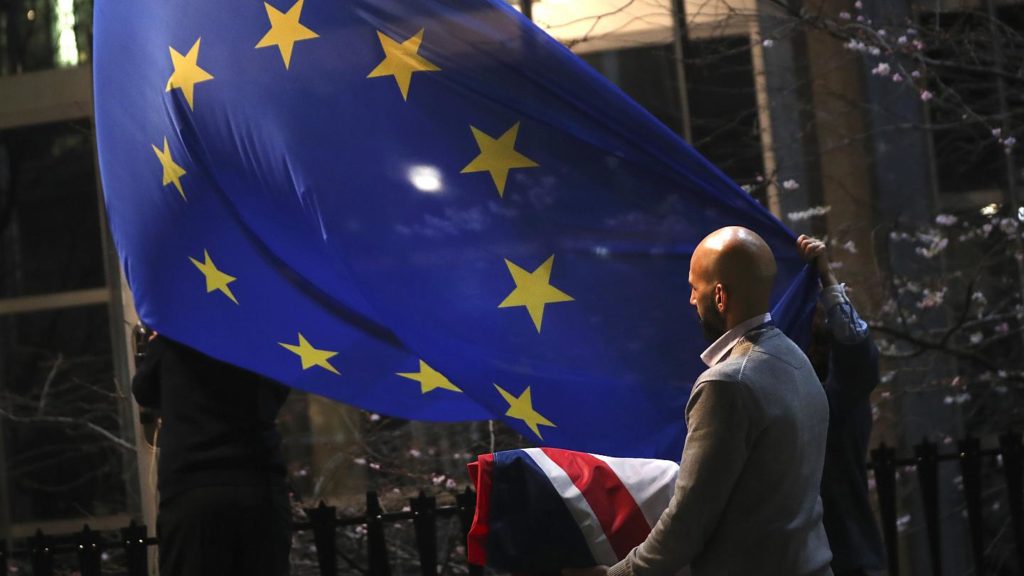Boris Johnson likes to model himself on Winston Churchill but the comparison does not stand up to scrutiny and the conclusion of his Brexit deal was hardly a “Churchillian moment”.
In fact, the British Prime Minister gave a surprisingly lack-lustre speech to the UK parliament to present his deal. This is what he said: “We now seize this moment to forge a fantastic new relationship with our European neighbours based on free trade and friendly co-operation.”
Fantastic may be a great word to describe an actual “oven-ready meal”. It is unlikely to stand the test of time as the verdict on the EU-UK Trade and Co-operation Agreement.
There was nothing earth-shattering about Johnsons’ speech. As TS Eliot might have said, Britain left the Single Market “not with a bang, but with a whimper”. But despite appearances, certain aspects of the deal are truly momentous and very damaging.
For example, according to the Kälin-Kochenov Quality of Nationality Index, British citizenship has dropped 27.1% in value as a result of the loss of freedom of movement. The exchange rate merely wobbled. But the value of British passports has fallen off a cliff.
Britain’s economy will be weaker every year and cumulatively so for every year the UK stays out of Europe. And the damage to the dreams and aspirations of those who are no longer able to exercise their right to live, love, work, study or retire in the EU will be permanent.
The horizon of opportunity for the entire British population has been shortened – an unprecedented loss of rights even in times of conflict let alone in peacetime. Yet this was the Prime Ministers’ peroration as he addressed the British nation on Christmas Eve: “So much for Brussels, now for the sprouts!”. So much for the soaring oratory one might add.
Thanks to the trade deal, Brussels sprouts are free to travel between the UK and the EU, as are tins of tomatoes and bags of potatoes. However, this is no longer the case for people. It is difficult to image a worse Christmas gift to British citizens and to Europe.
Boris Johnson boasted that his was a “cakeist treaty”. Not only had the Prime Minister been able to have his cake and eat it, he had also proudly secured the supply of German sausage, French cheese and Italian prosecco.
Less easy to digest was his decision not to allow the Erasmus exchange programme be part of the deal. Despite earlier indications to the contrary, students from Europe are now deprived of this opportunity to study in the UK as are Britons from doing so in Europe.
Perhaps the UK Government fears that exposing young people to the ‘European way of life” would undermine public support for the UK’s decision to leave the EU? The last thing it appears to want is for young people to discover a European identity. Why is that?
Brexiters may want to label as “remoaners”, those who are upset that they can no longer take their pet on holiday. But the UK has not just said goodbye to pet passports – free roaming charges are gone as well. Life is more complicated now for everyone who needs to cross borders, not just those who voted to remain.
Many non-tariff barriers also remain such as product specifications and regulations. It was the cost to trade of such impediments that led Margaret Thatcher to press for the creation of the Single Market in 197 with the Cockfield Report that led to the Single European Act. Margaret Thatcher is not normally thought of as a friend of the EU. But in comparison to the present Conservative government, she would qualify as one of Europe’s patron saints.
On we go down the list of shortcomings in a Brexit deal that is as note-worthy for what is in the treaty as for what has been left out.
Fish quotas were resolved in favour of the EU, with the UK only retaining a 25% of the EU’s fishing rights for the next 5 years, not the 80% sought previously. The negotiations in December looked as though they were all about the fish. They turned out to be more about the chips, the bargaining chips, otherwise known as British fishermen.
There is very little on the issues of services although the service sector makes up 80% of the UK’s economy. The UK has lost access to the Schengen Information System which provides real time alerts to identify serious criminals and no longer has a voice on Europol. British lawyers do not know if judgements in UK courts will still be recognised in Europe
Social and economic rights are supposed to be protected but it is very difficult to see how this will work in practice. Expectations of the UK are very low. But will the EU have the political will to respond, if and when, Britain tries to tip the “level playing field’ in its favour?
Britain has retained its involvement in Euratom, ITER (nuclear fusion), Copernicus (earth monitoring) and Galileo (satellite surveillance but has no voice in shaping these programmes – in space, as on earth, it turns out that it is not possible to have your cake and eat it.
The conversation about the EU and UK’s future relationship has only just begun. Much damage has already been done, particularly in relation to free movement. At the same time there is a great deal of unfinished business still to be addressed.
The long and winding road will continue. I hope it will one day lead Britain back to the EU’s door.
By Roger Casale


